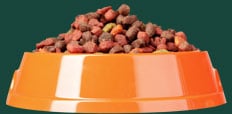"In 2001 a very special little kitten came to stay at our house named Emma. She weighed in at a whopping 2 ½ pounds. When she was about 9 months old she began vomiting and wouldn’t eat. The doctors at Piney Creek Square Veterinary Clinic took x-rays, but nothing showed up on them. She was losing weight, and she was thin by nature anyway, so everyone was worried about her. Dr. Behrns came to the rescue and performed emergency surgery on our little girl. She found an almond trying to pass into Emma’s stomach. Of course, it would not have shown up on an x-ray. Thank you, Dr. Behrns, for saving Emma’s life."
-Margo K.
Arthritis is a condition that unfortunately begets all of our pets at one time or another.
The incidence is more noted in large breed dogs (>50lbs) but we do see it occur in our small to medium dogs as well as cats. Pets that are overweight are also at increased risk.
In the early stages, identified by occasional difficulty rising/sitting down due to joint stiffness, your pet may see noticeable improvement with the addition of a daily glucosamine/chondroitin supplement and essential fatty acids like fish oils.
As arthritis progresses, it is inevitable that your pet would benefit from the addition of a Non-Steroidal Anti-Inflammatory (NSAID).
If you feel your pet is suffering from arthritis of any degree, please contact our staff so that the veterinarians at Piney Creek Square Integrative Veterinary Medicine can determine the best plan and appropriate supplement doses to meet your pet’s needs.
Additional information regarding this condition can be found at the following links:
PLEASE DO NOT GIVE ANY HUMAN, OVER-THE-COUNTER ARTHRITIS/PAIN MEDICATIONS (i.e. Aspirin, Advil, Tylenol, Aleve, etc.) The doctors at Piney Creek Square Integrative Veterinary Medicine do not advocate the use of over-the-counter medications since there is a significant difference between humans and animals and there metabolism of these chemicals. The veterinary formulations are designed for the dogs and cats we treat and are therefore much safer.
Seasonal Tips & More
Our Professionals
Make An Appointment
Request a Refill
PINEY CREEK SQUARE
INTEGRATIVE VETERINARY MEDICINE
15420 E Orchard Rd
Centennial, CO 80016
HOURS
Monday through Friday from 8:00 a.m. – 6:00 p.m.
Closed from Noon to 1:30 p.m. for lunch
Closed Saturday’s, Sunday’s and major holidays.
© 2022 PINEY CREEK SQUARE INTEGRATIVE VETERINARY MEDICINE
While we often refer to clients to these resources, their inclusion on Piney Creek Square Integrative Veterinary Medicine’s site does not constitute an endorsement unless otherwise stated. Piney Creek Square Integrative Veterinary Medicine is not responsible for any outdated or incorrect information or links from these sites.

Website by Mad Cow Web Design